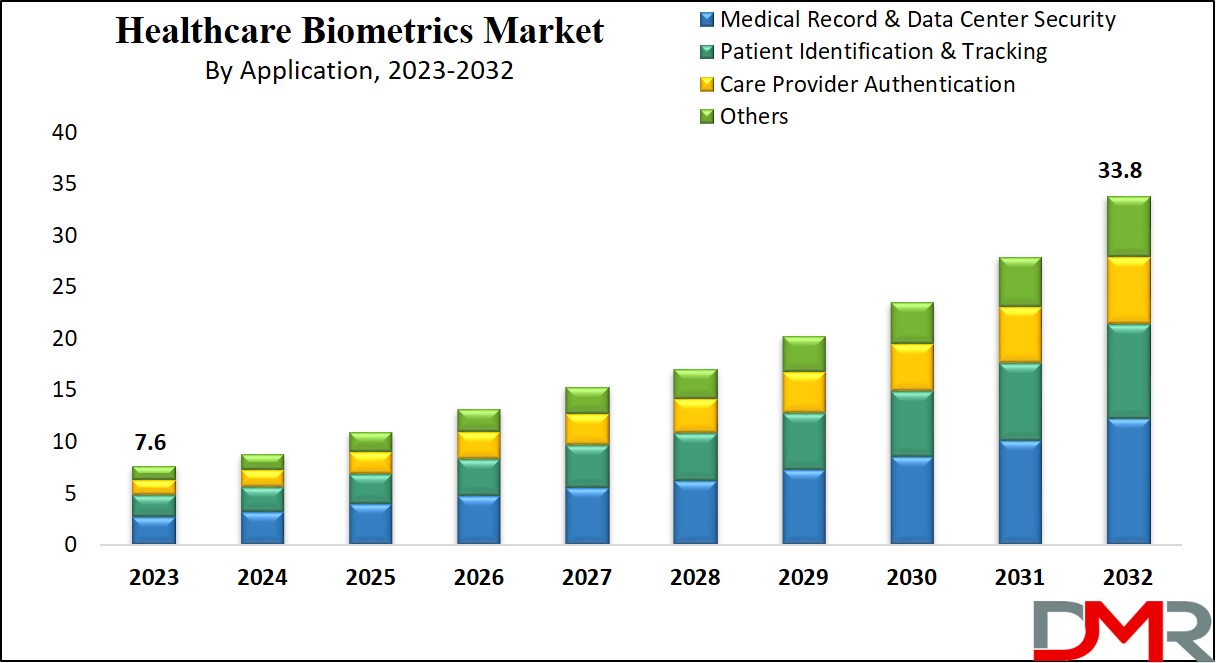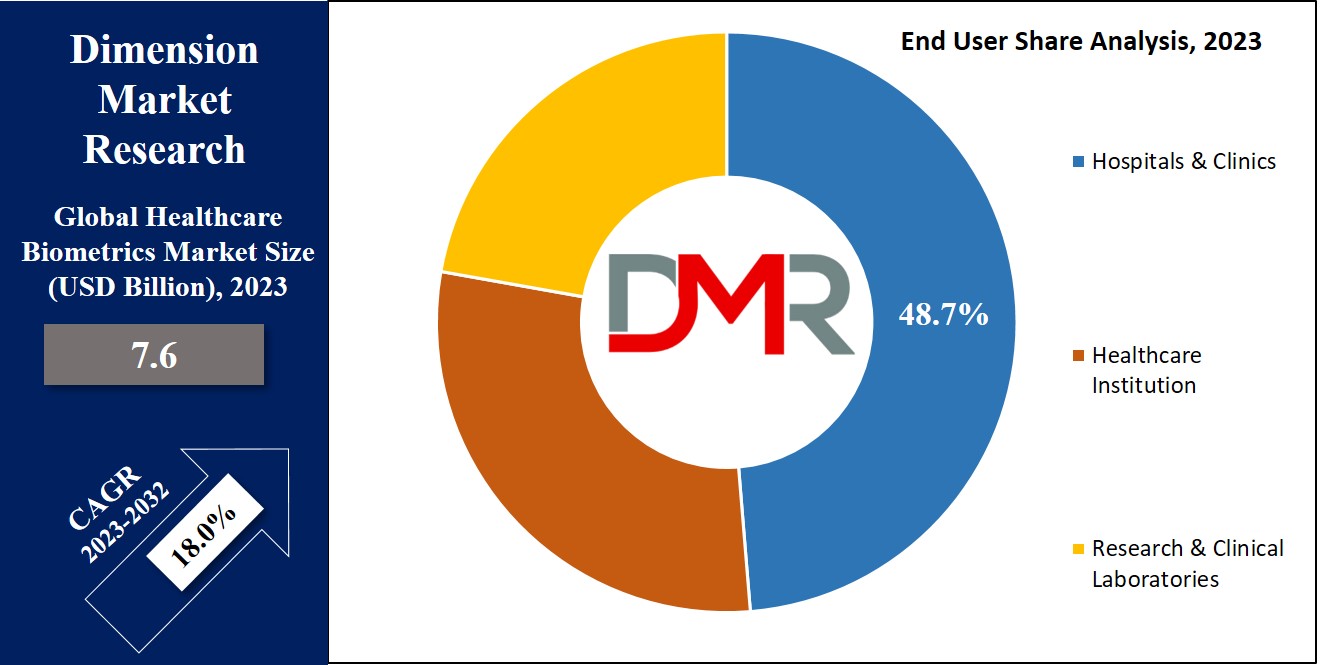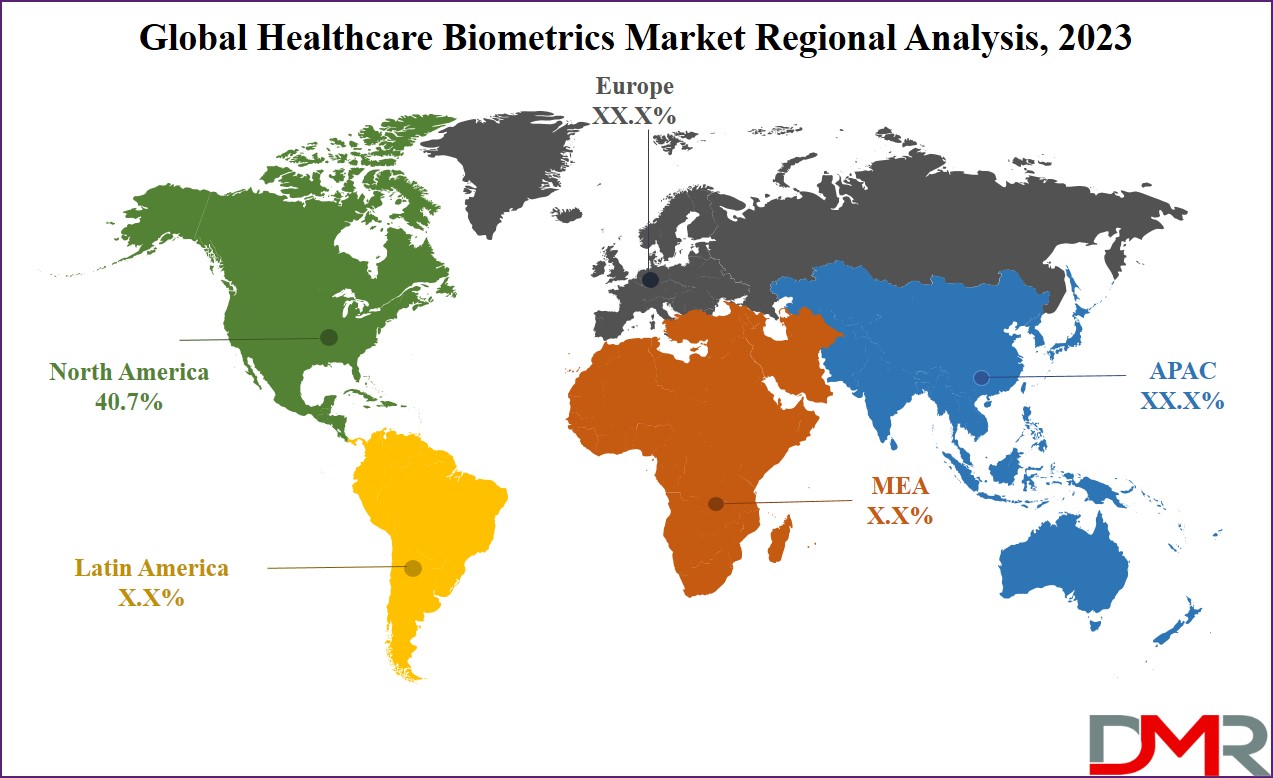Market Overview
The
Global Healthcare Biometrics Market is expected to reach a value of
USD 7.6 billion in 2023, and it is further anticipated to reach a market value of
USD 33.8 billion by 2032 at a
CAGR of 18.0%. The market has seen significant growth over the past few years and is predicted to grow significantly during the forecasted period as well.
Medical biometrics uses physical & behavioral data like fingerprints, iris scans, and more in healthcare. Biometric identifiers are utilized in
healthcare services for patient identification, access control, & information security.

By growing accuracy & security, medical biometrics can enhance patient safety, reduce fraud, & streamline management processes. It also assists in the integration of patient information between hospitals, supporting to enhancement of health outcomes & personalization.
As per cloudwards By 2024, trust in companies' ability to protect biometric data plummeted, with only 5% of consumers expressing confidence, down from 28% in 2022. Conversely, those lacking trust rose sharply from 22% to 42%. This shift highlights growing skepticism among consumers regarding data security practices.
Concerns about biometric technologies surged significantly between 2022 and 2024. Fears of misuse increased from 69% to 88%, while worries about data breaches grew from 69% to 86%. These trends underscore heightened consumer apprehension about the safety of their biometric information.
The Global Healthcare Biometrics Market is experiencing significant expansion as healthcare organizations increasingly adopt biometric solutions to ensure patient identification and security. Solutions like fingerprint, facial recognition and iris scans are helping healthcare facilities to improve patient identification accuracy while simultaneously combatting fraud and providing enhanced access control in healthcare facilities.
Recent advances in biometric technologies are designed to maximize user convenience and security. Their incorporation with electronic health records (EHR) and mobile health apps is rapidly growing, providing seamless authentication processes that benefit both patients and healthcare providers, thus improving operational efficiency as well as patient experience.
Rising demands for increased
security and privacy measures in healthcare are driving biometric adoption. Due to an ever-increasing volume of patient data and rising threats from cyber attacks, healthcare institutions are investing in biometric solutions as an additional layer of security at every point of care for patient authentication purposes.
Biometric solutions present key opportunities in emerging markets where healthcare infrastructure is rapidly expanding. As healthcare systems adapt digital solutions and adopt biometrics as part of streamlining processes, reducing fraud, and providing enhanced patient care, biometrics will play an integral part. Furthermore, innovations in contactless biometrics may spur adoption as response to COVID-19 pandemic and its increasing need for hygiene-conscious technology.
Market Dynamic
The growing developments of Healthcare Information Exchanges (HIE) to coordinate care are anticipated to drive increased demand for technologies addressing data corruption and unauthorized access, which is expected to contribute to the market growth of healthcare biometrics in the forecast period.
Further, the implementation of biometrics is seen as a crucial step to improve security for patients, doctors, & nurses, aligning with stringent regulations like HIPAA, which emphasizes patient information confidentiality and privacy. Compliance with these regulations is projected to propel the integration of biometrics in healthcare systems, fostering market growth.
In addition, advancements in existing technologies & the development of multipurpose authentication devices are expected to facilitate the commercialization of advanced biometric products. The rise of consumerism in healthcare, along with increased disposable income in emerging countries, is expected to further boost the adoption of advanced technologies like biometrics in the healthcare sector.
Research Scope and Analysis
By Technology
In terms of technology, the Healthcare Biometrics Market is categorized into various segments, such as face recognition, iris recognition, hand recognition, vein recognition, fingerprint recognition, signature recognition, and others. In 2023, the fingerprint identification market holds the largest share, owing to its increasing reliability & user-friendly access.
The incorporation of DNA recognition improves system security, anticipated to drive the need for biometric systems in the healthcare sector. Further, fingerprint recognition, the most widely used global
biometric system, is now extending its market presence to small-scale industries.
In addition, face recognition emerges as a rapidly growing segment, gaining popularity across diverse sectors owing to ongoing modernization efforts, which significantly contributes to upholding resistance against fraud cases, thereby safeguarding patient data & information and preventing instances of malpractice in the healthcare sector.
By Application
The market segmentation based on application divides the Healthcare Biometrics Market into categories like Medical Record & Data Center Security, Patient Identification & Tracking, Care Provider Authentication, and Others. Among these, in 2023, the segment on medical information & information security claims the biggest share, attributed to strict government regulations, like the Health Information Technology for Economic & Clinical Health (HITECH), aimed at securing patient information privacy.
Further, the rise in electronic health record (EHR) adoption within healthcare facilities boosts market growth. In the landscape of healthcare, information security extends across different endpoints, including devices like mobile phones, tablets, laptops, desktops, & connected devices like printers & papers. As healthcare acknowledges digitization, securing patient data becomes a priority, and the Healthcare Biometrics Market addresses this crucial need through diverse applications.
By End User
Hospitals & Clinics take the lead in embracing the large use of advanced healthcare biometric technology in 2023, particularly to manage the bigger crowds accompanying patients &alleviate operational challenges experienced by
medical staff. The healthcare biometric system serves an important role in authenticating people's entry, enabling only eligible individuals into the main premises of hospitals, thereby reducing chaos.
Further, in healthcare institutions, where this technology is employed to regulate crowd flow & prevent disruptions to the normal functioning of the hospital environment. Moreover, research & clinical laboratories recognize the imperative need for high-level security to safeguard patient data & information.
The use of advanced security features is important to ensure absolute privacy, security, & confidentiality of patient information, which necessitates healthcare systems to upgrade their functionality & facilities, aligning with enhancing security standards to uphold the integrity of patient data.

The Healthcare Biometrics Market Report is segmented on the basis of the following:
By Technology
- Face Recognition
- Iris Recognition
- Hand Recognition
- Fingerprint Recognition
- Vein Recognition
- Signature Recognition
- Others
By Application
- Medical Record & Data Center Security
- Patient Identification & Tracking
- Care Provider Authentication
- Others
By End User
- Hospitals & Clinics
- Healthcare Institution
- Research & Clinical Laboratories
Regional Analysis
Claiming the largest market share at 40.7% in 2023, North America is expected to significant growth in the global healthcare biometrics market, as this expansion is anticipated owing to major players introducing advanced medical biometric systems in the region. The constant innovation & launches contribute to North America's prominence in adopting advanced healthcare biometrics technologies.
Further, the Asia Pacific region is set to experience significant growth throughout the forecast period, which is driven by proactive initiatives undertaken by healthcare providers & hospitals in the region to integrate biometric solutions into their systems. As healthcare landscapes evolve, Asia Pacific emerges as a key region, highlighting growth in awareness & willingness to acknowledge innovative biometric solutions, marking a transformative switch in the healthcare sector within the region.

By Region
North America
Europe
- Germany
- The U.K.
- France
- Italy
- Russia
- Spain
- Benelux
- Nordic
- Rest of Europe
Asia-Pacific
- China
- Japan
- South Korea
- India
- ANZ
- ASEAN
- Rest of Asia-Pacific
Latin America
- Brazil
- Mexico
- Argentina
- Colombia
- Rest of Latin America
Middle East & Africa
- Saudi Arabia
- UAE
- South Africa
- Israel
- Egypt
- Rest of MEA
Competitive Landscape
In the healthcare biometrics market, key players dominate by striving for joint ventures & collaborations in the forecast period. These systems, along with growing awareness & integrated solutions across different sectors, represent key strategies. Further, the market players focus on implementing these approaches to enhance the effectiveness & reach of healthcare biometric technologies in the market.
For instance, in March 2022, BioIntelliSense introduced the BioButton Rechargeable, a medical-grade wearable device, which enables ongoing monitoring of over 20 vital signs & physiological biometrics for up to a month on a single charge, depending on the configuration. The BioButton Rechargeable provides an extended monitoring capability, improving its utility in healthcare by delivering continuous & comprehensive health data.
Some of the prominent players in the global Healthcare Biometrics Market are:
- NEC Corp
- Fujitsu Ltd
- Thales Group
- Siemens AG
- 3M Cogent
- Morpho
- Imprivata Inc
- Zkteco Inc
- Facetec Inc
- Suprena Inc
- Other Key Players
COVID-19 Pandemic & Recession: Impact on the Global Healthcare Biometrics Market
The COVID-19 pandemic & subsequent economic recession have majorly shaped the global healthcare biometrics market. The growing awareness of hygiene & infection control has expanded the adoption of biometric solutions, like touchless fingerprint recognition & facial recognition, to enhance security & reduce physical contact in healthcare settings. However, the economic recession made some organizations reevaluate their budgets, potentially slowing down market growth. However, even after the recession, the pandemic has highlighted the importance of strong healthcare security measures, fueling investments in biometric technologies. The market is navigating a dynamic landscape, balancing the necessity for enhanced security with economic challenges, as healthcare providers look for efficient &secure biometric solutions in the evolving post-pandemic era.
Report Details
| Report Characteristics |
| Market Size (2023) |
USD 7.6 Bn |
| Forecast Value (2032) |
USD 33.8 Bn |
| CAGR (2023-2032) |
18.0% |
| Historical Data |
2017 - 2022 |
| Forecast Data |
2023 - 2032 |
| Base Year |
2022 |
| Estimate Year |
2023 |
| Report Coverage |
Market Revenue Estimation, Market Dynamics, Competitive Landscape, Growth Factors and etc. |
| Segments Covered |
By Technology (Face Recognition, Iris Recognition,
Hand Recognition, Fingerprint Recognition, Vein
Recognition, Signature Recognition, and Others), By
Application (Medical Record & Data Center Security,
Patient Identification & Tracking, Care Provider
Authentication, and Others), By End User (Hospitals
& Clinics, Healthcare Institution, and Research &
Clinical Laboratories) |
| Regional Coverage |
North America – The US and Canada; Europe – Germany, The UK, France, Russia, Spain, Italy, Benelux, Nordic, & Rest of Europe; Asia- Pacific– China, Japan, South Korea, India, ANZ, ASEAN, Rest of APAC; Latin America – Brazil, Mexico, Argentina, Colombia, Rest of Latin America; Middle East & Africa – Saudi Arabia, UAE, South Africa, Turkey, Egypt, Israel, & Rest of MEA
|
| Prominent Players |
NEC Corp, Fujitsu Ltd, Thales Group, Siemens AG, 3M
Cogent, Morpho, Imprivata Inc, Zkteco Inc, Facetec
Inc, Suprena Inc, and Other Key Players |
| Purchase Options |
We have three licenses to opt for: Single User License (Limited to 1 user), Multi-User License (Up to 5 Users), and Corporate Use License (Unlimited User) along with free report customization equivalent to 0 analyst working days, 3 analysts working days and 5 analysts working days respectively. |
Frequently Asked Questions
The Global Healthcare Biometrics Market size is estimated to have a value of USD 7.6 billion in 2023 and
is expected to reach USD 33.8 billion by the end of 2032.
North America has the largest market share for the Global Healthcare Biometrics Market with a share of
about 40.7% in 2023.
Some of the major key players in the Global Healthcare Biometrics Market are NEC Corp, 3M Cogent,
Thales Group, and many others.
The market is growing at a CAGR of 18.0 percent over the forecasted period.